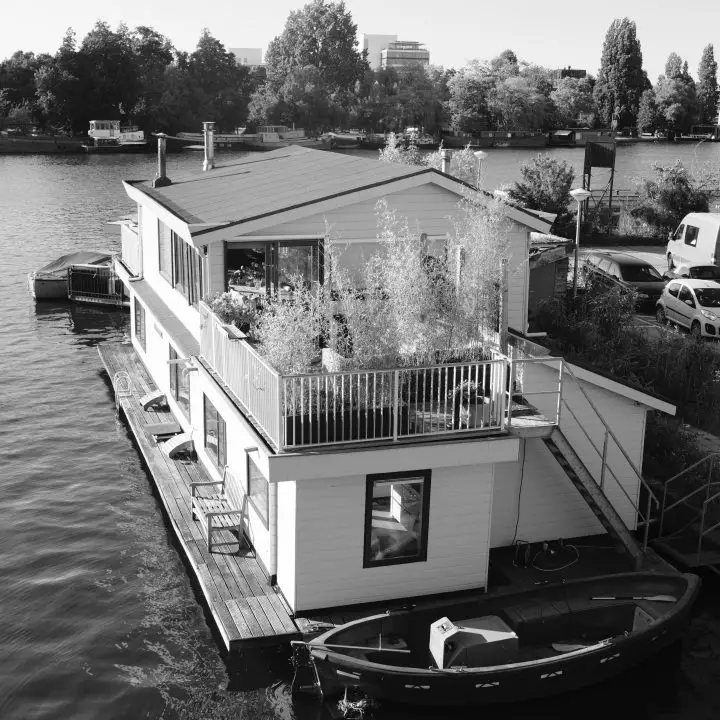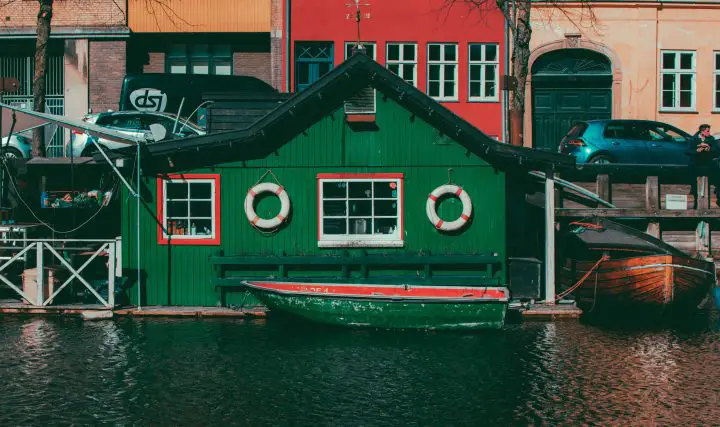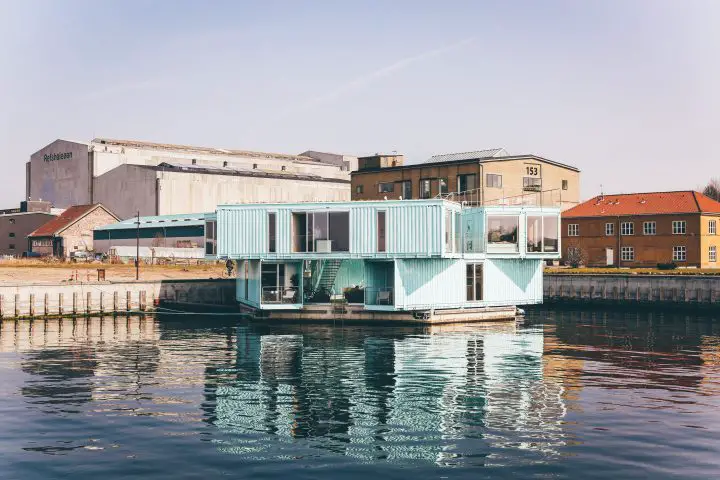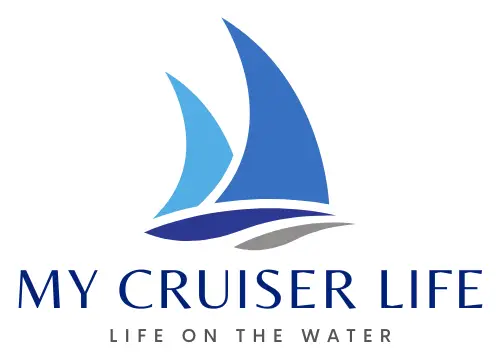Have you ever dreamed of selling it all and living on a houseboat? Houseboats are some of the most comfortable liveaboard vessels, but they also come with some important limitations. Here’s a look at the pros and cons of going all in on the houseboat lifestyle.

Table of Contents
- What Is a Houseboat?
- Can You Live On A Houseboat Full Time?
- Advantages of Houseboat Living
- Full Time on a Houseboat Disadvantages
- Advantage or Disadvantage? You Decide
- Full Time Houseboat FAQs
What Is a Houseboat?
A houseboat is a very specific type of vessel. They are generally boxy and look more like motor coaches on the water than traditional boats. They may be one or two levels, ranging from 30 to 80 feet long. They’re not very seaworthy because of their tall sides and boxy shape, so you’ll often find them on inland lakes. Some stouter models can be found in coastal waters.
The term houseboat might seem vague to some and very specific to others. Outside the boating community, it’s common to refer to any boat being lived on as a house boat.
There’s a separate category of boats known as floating homes. These look even more like a house built on land and less like a boat. They’re less able to navigate on their own. In fact, many are built on barges and have no engine of their own—if they need to move, they get towed. They are designed to provide living accommodations in one spot without ever leaving.
Can You Live On A Houseboat Full Time?
Yes, it is legal for houseboat owners to liveaboard full time. However, there are several questions you need to answer before you can make it happen.
Living on a boat is a dream many share, and a houseboat is the perfect vessel. But, as in real estate, it’s all about location, location, and location.
Things to Consider
First off, houseboats aren’t appropriate everywhere. They’re best suited for protected waters that don’t see ocean swell or rough seas. You’ll find them most commonly on lakes, but they’re also popular in many protected bays and rivers.
So, could you live on a houseboat and take it to the Caribbean? Or cruise it on America’s Great Loop? No, it wouldn’t be the right boat for that. For these adventures, you need a cabin cruiser or a trawler that can handle more weather conditions than a houseboat could. In other words, you need something more “boaty” than a houseboat. Houseboats are only appropriate in certain locations and for certain types of trips.
Related: Best Boat for the Great Loop
Another location factor is finding a place that will allow you to live aboard. For various reasons, not every marina allows living on your boat. Sometimes, it’s just their policy; other times, they’re bound by local or state regulations.
Is it legal to live on a houseboat full time? It absolutely is, but finding a place to do it comfortably in your area might be difficult. If you’re eye a lake you want to live on, and the single marina operating there prohibits living aboard, you might be out of luck until you find another lake.
The final location problem is the weather—is it even possible to stay on a houseboat year round in your area? If the water freezes, chances are most owners have their boats hauled out of the water. Winter weather is tough on boats and can be dangerous. There’s slippery ice on the docks and the dangers of hypothermia if you fall in the water.
Freezing water can also wreck a boat’s systems, from the toilets to the air conditioners and engines. Winterizing a boat will protect its systems, but it also means that you can’t use those systems.
And what’s worse, boats are very difficult to heat. Most are built lightweight and have poor insulation. Wiring on the dock and in the boat is seldom up to running all the electric heaters you need; unfortunately, dock fires become more common as the weather gets colder.
Advantages of Houseboat Living
So, is living on a houseboat worth it? It’s all about your personality and what you hope to get out of it. Chances are you’ll love it if you love being on the water and boating in general.
Life on the water
You can’t beat waking up to sunrise over the water, eagles fishing nearby, and dolphins swimming around your house. The waterfront view and fresh air are worth it—most people just love living on the water.
Boating community
Living on a boat in a marina often attract like-minded souls. Many people love the community that develops around friendly marinas. In many cases, it’s the community that attracts them more than the actual boating.
Mobile Living
What if you hate your neighbors? Then move; it’s a boat, and that’s what it does. Find a new marina with a better community, or just mix it up and travel from spot to spot, staying as long as you like in each place.
More Space and Comfort Than Other Types of Boats
There’s no way around it, houseboats are some of the most comfortable boats to live on. Most boats from the top houseboat manufacturers offer enough space to have real furniture and appliances (not marine-brand versions). There are also spaces that feel much more like a normal house—a bathroom with a tub and shower, a living room with a real couch, and a patio with a real grill. Even a small houseboat will have the same space as a small apartment. If you choose to learn building a houseboat, you can customize it anyway you want.

Full Time on a Houseboat Disadvantages
It’s not always dock parties, sundowner cocktails, and calm, secluded anchorages, however. Living on any kind of boat will get on your nerves occasionally. The question you have to answer is, are the highs worth all the lows?
Less Space and Privacy Than a Land House
Even though houseboats are palatial compared to motorboats or living on a sailboat, you’ll still struggle with having too much stuff and downsizing. There’s always some extra gadget you just don’t have space for or a closet that is just too small for whatever you want to put in there.
Couples on boats wind up spending a lot more time with each other than couples who aren’t on boats. In some cases, it’s a good thing. When it comes down to daily living, it can sometimes not be a good thing.
More Maintenance Than a Traditional House
Boats break down and need a lot of maintenance. The water is always trying to get in, and parts are always corroding and rusting away. The larger and more complicated a boat is, the worse your problems will be.
Finding Marinas and Limited Choices
Not every marina allows liveaboard, and some lakes prohibit them altogether. You don’t have unlimited options of where you can go. Plus, trucking your boat somewhere else might be expensive if you are house-boating on a land-locked lake. If you’re on the coast and houseboats are rare, you may find some marinas that won’t allow houseboats at all.
Heating and Cooling Problems
Boats have poor insulation, but the fact that water conducts heat better than air does not help. In the winter, you’ll have to deal with the risk of freezing waterlines and internal components during the winter months. There’s also the problem with condensation, which can make any boat moldy and mildewy in no time.
Similarly, boats are difficult to cool in the summer. Houseboats usually have rooftop or window air conditioners, which are more reliable than water-cooled marine units. But it’s not cheap, and many marinas charge you for metered power at exorbitant rates.
Tax Issues
Lack of property taxes gets batted around a lot by folks who want to live on a boat. If you own real estate, you know you’ll pay property taxes to your local county. Boats are not generally taxed the same way but are still taxed. And if you want to get technical, the marina where you’re docked pays property tax—and they aren’t paying for it out of their pockets. So boaters are paying property taxes, just in the form of higher slip fees.
But there are a bunch of other taxes that a houseboat owner must pay. Nearly every state requires boats to be registered annually like a car. To register your boat in the first place, you’ll have to prove you paid sales tax on the purchase. Nearly every state requires you to register your boat, even if it is also Coast Guard documented or registered somewhere else. And finally, some US states also collect annual personal property tax on vessels.
Is It Actually Cheaper to Live on a Houseboat?
A houseboat can seem like a frugal way to live, especially in areas where real estate is very expensive. And since boats get you access to waterfront property, you’ll have similar views to the millionaires and billionaires in all those waterfront mansions.
But are there really any financial advantages? Can you save money by living on a houseboat? How much are houseboats? The answer isn’t satisfying, but it’s the truth–it depends. The only way to find out for sure is to crunch the numbers. How much will a house cost in the area, with all the associated expenses, including property tax, insurance, and everything else? Then, compare it to a similar list of how much a houseboat costs, with slip fees, maintenance, and winter haulouts.
It’s impossible to put together meaningful numbers. For every person doing it on $500 a month, someone can’t make it happen for less than $5,000 a month. Like with houses, our living standards and local cost of living play a factor.

Advantage or Disadvantage? You Decide
There are a ton of issues that don’t fall neatly into the black-and-white, plus-and-minus categories. Some readers might have already thought about that since some advantages might have looked pretty bad to some people, and some disadvantages look pretty good.
Count me in on living in smaller spaces—but I know most people are not. So, what’s right for you?
Full Time Houseboat FAQs
Is Full-Time Houseboat Living Worth It?
It depends—full-time living on a houseboat is a personal lifestyle choice that isn’t for everyone. While houseboats are roomy and comfortable compared to other types of vessels, they’re still boats. There will be maintenance issues and inconveniences associated with life on the water—you’re more exposed to the weather, the plumbing is dodgy, the electricity is limited, maintenance and cleaning tasks can seem never-ending, etc.
What Is The Most Expensive Cost Associated With Living On A Houseboat?
If you’re taking out a loan to pay for your houseboat, expect the payment to be your biggest monthly expense. Boat loans seldom have the best interest rates, even if the terms can be long (20 years is the usual).
How Can The Cost Of Living On A Houseboat Be Reduced?
As with any type of boating, the best way to reduce your expenses is to purchase the most modest vessel you can comfortably live on. Larger boats will cost more outright, but they’ll also cost more in marina fees and maintenance. It’s nearly always better to pick a smaller boat in the best condition you can afford versus a larger one that needs work.
Where Is The Cheapest Location To Live On A Houseboat?
The biggest expense for most boaters is the slip fee, so you can find the cheapest accommodations by shopping for the cheapest marina. There are plenty of places where slips are only a few hundred dollars a month, but these might be in less-than-convenient areas with few amenities. And some marinas are run-down grungy places that aren’t worth that much.
Where Is The Most Expensive Location To Live On A Houseboat?
The most expensive places to keep a boat are places where there are great amenities that a lot of people want to be. This might be on a small lake where the marina is first-class, and lots of boaters want to live there—there’s probably a waitlist and a hefty slip fee at such a place. Another place where boating is expensive is in resort towns like Key West, Florida, or South Beach in Miami. A slip in these places can easily run you $3,000 per month or more because they are so popular and the number of slips is limited.
If you pay cash for the boat, the next biggest expense will be your slip fees. Houseboats aren’t the most seaworthy vessels, so they are berthed at a marina in most places. Slip fees will include electric, water, and sewer pump outs. Many marinas also charge a liveaboard fee if you’re onboard full-time.
